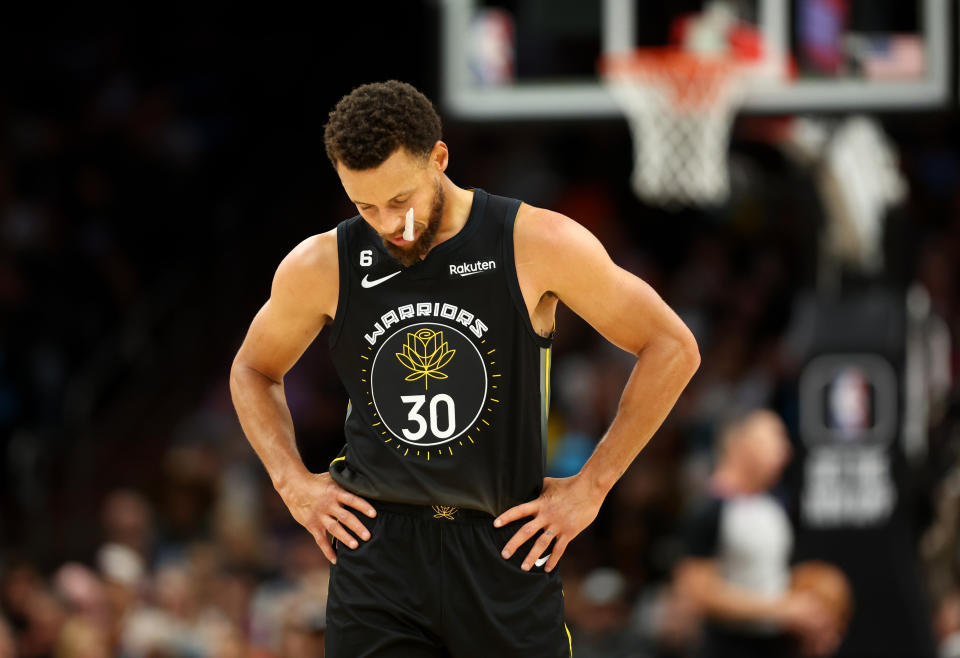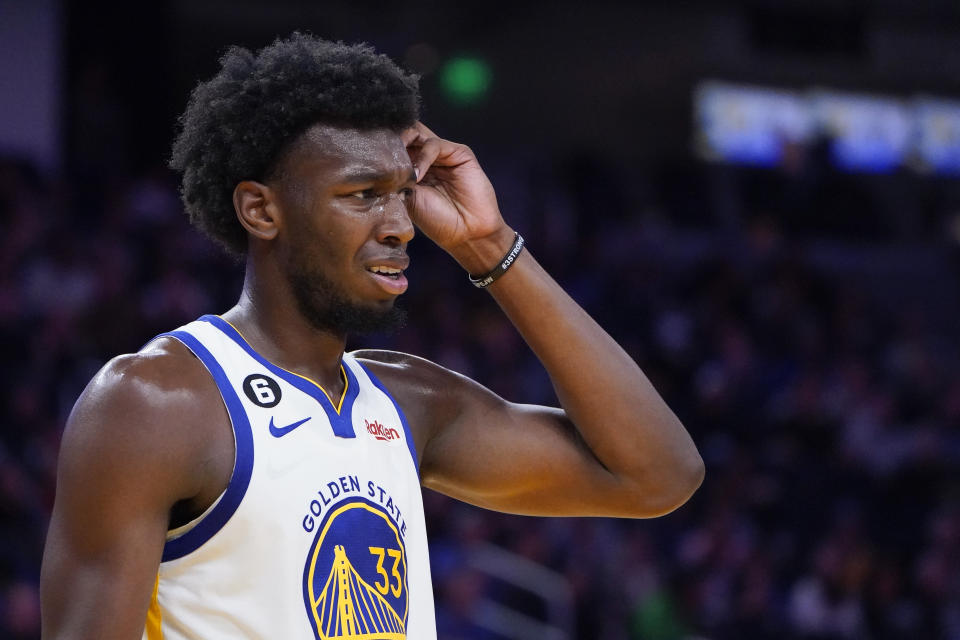The Golden State Warriors have avoided hard decisions in ways no modern NBA dynasty has ever, but the arc of history is bending back in that direction and is doing so very quickly.
Expeditiously.
Immediately.
Like, today.
General manager Bob Myers and head coach Steve Kerr have deftly and expertly walked a line, getting the best from the core while the supporting pieces provided just enough to squeeze out another championship. Yet it now appears that strong organizational bamboo is undergoing unplanned stress.
Sustained winning requires a singular focus, competence and a little luck. The competition in the NBA is too heavy, good teams are way too eager in seeing an opening at the top of a conference to merely plant roses at the feet of the champions.
It’s respect, but not reverence.
The NBA’s three biggest brand names — LeBron James, Stephen Curry and Kevin Durant — aren’t being augmented by their organizations, for various reasons and levels of culpability.
Unlike the Brooklyn Nets and Los Angeles Lakers, the Warriors still have a path out of the basement and back to the penthouse, but it seems the leverage they’ve acquired needs to be put to use.
One could argue Curry is having his finest season, and that’s considering he was an unanimous MVP seven seasons ago. But his greatness is pressing the Warriors into a corner the organization had better have a plan to crawl out of before this looks like franchise malpractice.
It’s not as easy as benching Klay Thompson or blaming the slow start on the fatigue of dealing with Draymond Green punching Jordan Poole in training camp.
“As far as the rollover, it’s good problems to have in this league. I’m not worried about the big picture,” Curry told Yahoo Sports weeks ago following a road loss in Detroit. “We’ve been through this before, too. This is the first time in awhile. But I know the process.”
It’s easy to assume a team like the Warriors picks up where it left off last June, but they start from scratch like everybody else. The problem is, they’re still at scratch.
“If you look at our team, it is different. So we have to treat this year as a separate, different year,” Curry said. “That’s the part that I’ve noticed, how we’ve been through this before so it’s no panic.”
When Curry spoke that night, he made sure to deliver an air of calm. Not arrogance but certainly a little concern.
“[Setting] realistic championships expectations for this specific team,” Curry said. “That’s why I was trying not to be too somber in the press room because everybody’s holding us — as they should — to that expectation that we’re supposed to be [undefeated]. That’s not how that works.”


Kerr decided to say what everyone with trained eyes already believed — that there’s no cohesion on either end of the floor and no easy solutions.
The losses are piling up and even if it’s a champion merely easing its way into a new season after a long playoff run from the summer, it’s getting late pretty early. The Warriors have the second-worst defense in points against and 27th in defensive rating.
For all the flash they displayed in winning four championships, the work that was done on the defensive end was what keyed everything else. No other team had the mental stamina to keep up with the Warriors for long stretches — you could see it in the Finals last year when the Celtics unraveled, and before that when the brash Memphis Grizzlies couldn’t figure out a consistent formula to unseat them.
The invincibility factor is gone. Even if one could make the claim that intimidation left the building when Durant left a few years ago, there was still extra magic when the Warriors came into your building.
The champions usually get an opponent’s best shot anyways, but it’s born from a respectful fear of embarrassment — that Curry might unleash a flurry of triples, shimmies and coy smirks, that Thompson would stone-face the guy in front of him into an off-night, all while feasting on open shots, and that Green would talk an entire 12-man roster into uncharacteristic stretches.
Usually, a combination of two plus a little something extra would be the formula and the Warriors could continue their road tour to another stop. The Warriors might not yet be food, but other teams are lathered up for a helping — all while knowing Curry is capable of putting up a 50-ball.
The more Curry keeps putting up these sterling performances and opponents find a way to absorb the body shots to deliver their own knockout, the more confidence the NBA at large will have in believing there’s a formula to dethrone the champs.
The modern dynasties all had to initiate difficult conversations to keep it going and give it new life. For the Showtime Lakers, it was unleashing Magic Johnson and scaling back an aging Kareem Abdul-Jabbar — after three championships underneath a previous formula, no less. Magic won three MVPs in the next four years, the Lakers won another two titles and did their best to withstand time catching up to Abdul-Jabbar.
Larry Bird’s Celtics had to replace the hard-driving Bill Fitch with the more affable K.C. Jones, even after Fitch led the Celtics to a title in 1981. Bird’s offseason regimen and in-season habits greatly improved, and he went on a run of three straight MVPs and four straight Finals appearances.
Of course, Michael Jordan’s Bulls went from hating Dennis Rodman to a full-on embrace, giving Rodman a colorful second act in their second three-peat. History says those were easy decisions to make, but in real time, it was all a risk.
Even the San Antonio Spurs, the most recent team dynasty — not counting James’ run of conference dominance in the last decade — had to change from a grinding style centered around Tim Duncan to more spacing and drive-and-kick, and room for others to cook.
Look, even New Edition added Johnny Gill to the mix.
And it’s certainly easy to place blame on young players who haven’t fulfilled expectations, players who, in virtually any other situation in the NBA, would have the runway to make mistakes on the fly because the stakes aren’t that high.


James Wiseman has barely played enough real-time competitive basketball over the last few years to contribute in a high-octane, fast-moving environment, let alone succeed in this pressurized vacuum the Warriors have created.
He played three college games, missed half his rookie season and didn’t play at all last season. His memories of dominating competition date back to his tender high school days, and that minor sweat equity doesn’t carry over. Curry just wants him to sprint into ball screens and move with purpose.
Moses Moody and Jonathan Kuminga have increased roles, but they can’t be the catalysts for a turnaround, and thus the pressure is tenfold because everyone knows any outside help would require their exits.
The Warriors could sell the veterans and young players alike on sacrificing for the sake of winning. But for the young players who know the spoils of team success but not individually, it’s human nature to want to establish oneself rather than immersing selfishly into a team dynamic.
Because you’ve already won.
And while the odds are easy to say the Warriors will turn it around on their own, no one can ignore the blaring warning signs calling for substantive change.
